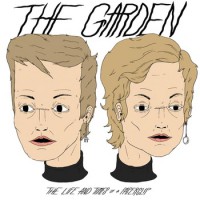
The Garden
The Life and Times of a Paperclip (2013)
John Gentile
This is what I've been searching for in modern punk rock. The Garden, which is twin brothers Wyatt and Fletcher Shears, are cold, menacing, energetic, and just weird as hell. Their third album The Life and Times of a Paperclip shows the brothers incorporating just enough traditional structure into their world of weirdness (which they dubbed Vada Vada) that the music is entirely alien, but just recognizable enough to be captivating.
With only Wyatt on bass and Fletcher on drums, the band cut though 16 tracks which are each about a minute long. For most of the songs, the bass is low and loud, with a sound that hits as hard as a buzzsaw guitar. Meanwhile the drums charge along, influenced only by the stranger beats of the oldest Wire songs.
The songs seem to start off as normal punk numbers, with the brothers charging forward. But on "The Apple" they start with a killer, spaced-out riff in what seems to be a standard rock and roller until the end, when it flips on itself and instead of riding the riff, the brothers ride out a spacy, instrumental jam. Likewise, "Vada Vada" starts out with Wyatt frantically calling out "Vada Vada" before the song suddenly stops after 19 seconds.
The entire album continues this trajectory. Sometimes starting out with a seemingly normal path, only to twist on itself and get weird and unexpected by the end. Like jazz, constant change is the key here, but unlike jazz, the music continually pulls you forward instead of beating down on you.
Likewise, the brothers, who have devised a sort of secret language between them, sing about strange concepts, only the most basic of which are discernable. "The Moth" seems to be about a moth staring at the brothers. But on "Grass," Wyatt screams "Mowed on! Stepped on! Pissed on!" Is he really singing about the anguish of grass or something else? On top of that, I never considered the fact that grass might have anguish to begin with.
Paperclip is the Garden's most accessible release, following the maximum-minimalistic self-titled tape and the more traditional, but still weird, Everything is Perfect. But "accessible" for the Garden still means deliciously weird for the rest of us. This release is exciting and challenging, but like the first Wire album which flirted with these concepts, is inviting because it never dwells too much on one concept and has eccentricities around every corner. One of the best releases of the year, without a doubt.